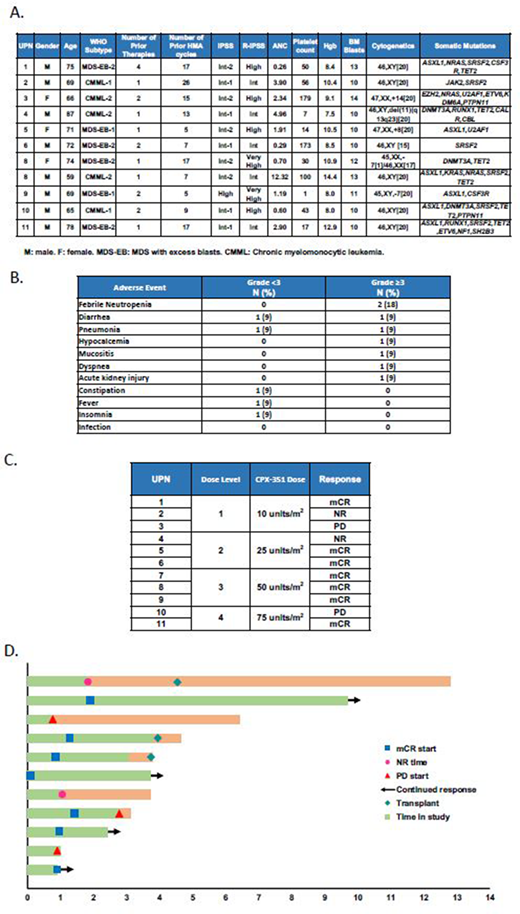INTRODUCTION: Hypomethylating agents (HMAs) are the standard of care of patients (pts) with higher-risk myelodysplastic syndromes (MDS) and chronic myelomonocytic leukemia (CMML). HMA failure is associated with poor outcomes, with a median survival of only 4 to 6 months. There are currently no effective standard therapies for these patients. Prior studies have shown that different combinations of purine analogues and cytarabine can be effective in patients with higher-risk MDS and CMML after HMA failure (HMA-F). CPX-351 is a liposomal formulation of cytarabine and daunorubicin approved for the treatment of pts with newly diagnosed therapy-related acute myeloid leukemia (AML) or AML with MDS related changes. Here we present the initial results of a phase I/II study of CPX-351 for high-risk MDS and CMML after HMA-F.
METHODS: We designed a phase I/II clinical trial of CPX-351 for pts with MDS or CMML after HMA-F with Int-2 or High risk by IPSS, or Int-1 with >10% bone marrow blasts. The study included an initial phase 1 dose escalation portion, following a 3+3 design, followed by a phase 2 dose expansion portion. Dose escalation included 4 dose levels of CPX-351: 10 units/m2 (daunorubicin 4.4mg/m2 and cytarabine 10mg/m2), 25 units/m2 (daunorubicin 11mg/m2 and cytarabine 25mg/m2), 50 units/m2 (daunorubicin 22mg/m2 and cytarabine 50mg/m2) and 75 units/m2 (daunorubicin 33mg/m2 and cytarabine 75mg/m2). Therapy was administered intravenously on days 1, 3 and 5 of 28-day cycles during induction and on days 1 and 3 of re-induction or consolidation. In pts not achieving response after induction, the study allowed re-induction. The primary end point was to evaluate the safety and determine the maximum tolerated dose of CPX-351. Responses were evaluated following 2006 IWG criteria. The study included stopping rules for toxicity and futility. The Kaplan-Meir product-limit method was used to estimate survival. Overall survival was calculated from time of treatment start to last follow up or death.
RESULTS: At the current data cut off of July 16th 2020 a total of 11 pts have been treated: 6 with MDS and 5 with CMML. Four (36%), 6 (55%) and 1 (9%) pts had Int-1 risk by IPSS with >10%, Int-2 or High risk by IPSS, respectively. Median age was 71 years (range 59-87) and 72% pts were male. Six (55%) pts had normal karyotype and 8 (72%) had high-risk mutations including ASXL1, RUNX1, EZH2 or RAS pathway mutations. Characteristics of pts are detailed in Figure 1A. The median number of prior therapies was 1 (range 1-4) with a median of 13 (range 5-26) cycles of prior HMA. Two patients had received prior therapy with venetoclax. No DLTs have been observed to date up to the maximum dose of 75 units/m2 of CPX-351. Median number of administered cycles of therapy is 1 (range 1-7). A total of 5 (45%) pts had non-hematological adverse events as detailed in Figure 1B. Eight-week mortality was 0%. All patients are evaluable for response with an overall response rate of 64% (n=7). Responses included mCR in all pts (Figure 1C) with one pt having achieved HI for <8 weeks. Two pts required re-induction prior to achieving mCR. The median response duration is 1.3 months (0-7.8 months). Two pts proceeded to allogeneic-stem-cell transplantation after achieving response to therapy. Three patients experienced transformation to AML: 2 after cycle 1 of therapy without prior response, and 1 after 1 month of having achieved mCR. Patient disposition is detailed in Figure 1D with time during study showed in green and continued follow up once off study in orange. With a median follow up of 3.8 months the median event-free survival is 2.4 months (range 0.9-3.9) and the median overall survival has not been reached.
CONCLUSIONS: Preliminary data suggests lower doses of CPX-351 in higher-risk MDS and CMML after HMA failure can induce marrow responses with acceptable toxicity profile. Further follow up is required to determine response duration and survival benefit and to determine its potential role in HMA failure.
Jabbour:Amgen: Other: Advisory role, Research Funding; Adaptive Biotechnologies: Other: Advisory role, Research Funding; Takeda: Other: Advisory role, Research Funding; BMS: Other: Advisory role, Research Funding; AbbVie: Other: Advisory role, Research Funding; Genentech: Other: Advisory role, Research Funding; Pfizer: Other: Advisory role, Research Funding. Kadia:Pfizer: Honoraria, Research Funding; Genentech: Honoraria, Research Funding; Cellenkos: Research Funding; Amgen: Research Funding; Astra Zeneca: Research Funding; Incyte: Research Funding; Abbvie: Honoraria, Research Funding; JAZZ: Honoraria, Research Funding; Astellas: Research Funding; Pulmotec: Research Funding; Ascentage: Research Funding; Cyclacel: Research Funding; Celgene: Research Funding; Novartis: Honoraria; BMS: Honoraria, Research Funding. Ravandi:BMS: Consultancy, Honoraria, Research Funding; Astellas: Consultancy, Honoraria, Research Funding; Xencor: Consultancy, Honoraria, Research Funding; Amgen: Consultancy, Honoraria, Research Funding; Macrogenics: Research Funding; Jazz Pharmaceuticals: Consultancy, Honoraria, Research Funding; AstraZeneca: Consultancy, Honoraria; Orsenix: Consultancy, Honoraria, Research Funding; Celgene: Consultancy, Honoraria; Abbvie: Consultancy, Honoraria, Research Funding. Sasaki:Pfizer Japan: Consultancy; Otsuka: Honoraria; Novartis: Consultancy, Research Funding; Daiichi Sankyo: Consultancy. Faderl:Jazz Pharmaceuticals: Current Employment, Current equity holder in publicly-traded company. Kantarjian:Novartis: Honoraria, Research Funding; Jazz: Research Funding; Immunogen: Research Funding; Aptitute Health: Honoraria; Pfizer: Honoraria, Research Funding; Ascentage: Research Funding; Daiichi-Sankyo: Honoraria, Research Funding; BMS: Research Funding; Delta Fly: Honoraria; Actinium: Honoraria, Membership on an entity's Board of Directors or advisory committees; Abbvie: Honoraria, Research Funding; Janssen: Honoraria; Oxford Biomedical: Honoraria; Sanofi: Research Funding; BioAscend: Honoraria; Amgen: Honoraria, Research Funding; Adaptive biotechnologies: Honoraria. Garcia-Manero:Merck: Research Funding; Jazz Pharmaceuticals: Consultancy; AbbVie: Honoraria, Research Funding; Novartis: Research Funding; Astex Pharmaceuticals: Consultancy, Honoraria, Research Funding; Amphivena Therapeutics: Research Funding; H3 Biomedicine: Research Funding; Onconova: Research Funding; Genentech: Consultancy, Membership on an entity's Board of Directors or advisory committees, Research Funding; Bristol-Myers Squibb: Consultancy, Research Funding; Celgene: Consultancy, Honoraria, Research Funding; Helsinn Therapeutics: Consultancy, Honoraria, Research Funding; Acceleron Pharmaceuticals: Consultancy, Honoraria.
Author notes
Asterisk with author names denotes non-ASH members.


This feature is available to Subscribers Only
Sign In or Create an Account Close Modal